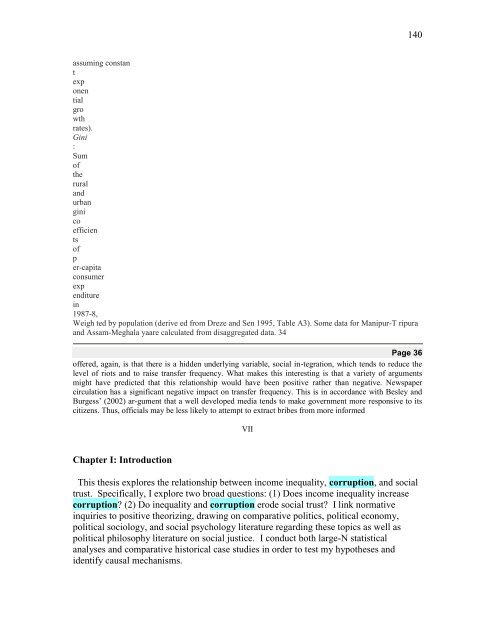FILSAFAT KORUPSI - Direktori File UPI
FILSAFAT KORUPSI - Direktori File UPI
FILSAFAT KORUPSI - Direktori File UPI
Create successful ePaper yourself
Turn your PDF publications into a flip-book with our unique Google optimized e-Paper software.
assuming constan<br />
t<br />
exp<br />
onen<br />
tial<br />
gro<br />
wth<br />
rates).<br />
Gini<br />
:<br />
Sum<br />
of<br />
the<br />
rural<br />
and<br />
urban<br />
gini<br />
co<br />
efficien<br />
ts<br />
of<br />
p<br />
er-capita<br />
consumer<br />
exp<br />
enditure<br />
in<br />
1987-8,<br />
Weigh ted by population (derive ed from Dreze and Sen 1995, Table A3). Some data for Manipur-T ripura<br />
and Assam-Meghala yaare calculated from disaggregated data. 34<br />
140<br />
Page 36<br />
offered, again, is that there is a hidden underlying variable, social in-tegration, which tends to reduce the<br />
level of riots and to raise transfer frequency. What makes this interesting is that a variety of arguments<br />
might have predicted that this relationship would have been positive rather than negative. Newspaper<br />
circulation has a significant negative impact on transfer frequency. This is in accordance with Besley and<br />
Burgess‟ (2002) ar-gument that a well developed media tends to make government more responsive to its<br />
citizens. Thus, officials may be less likely to attempt to extract bribes from more informed<br />
Chapter I: Introduction<br />
VII<br />
This thesis explores the relationship between income inequality, corruption, and social<br />
trust. Specifically, I explore two broad questions: (1) Does income inequality increase<br />
corruption? (2) Do inequality and corruption erode social trust? I link normative<br />
inquiries to positive theorizing, drawing on comparative politics, political economy,<br />
political sociology, and social psychology literature regarding these topics as well as<br />
political philosophy literature on social justice. I conduct both large-N statistical<br />
analyses and comparative historical case studies in order to test my hypotheses and<br />
identify causal mechanisms.

















